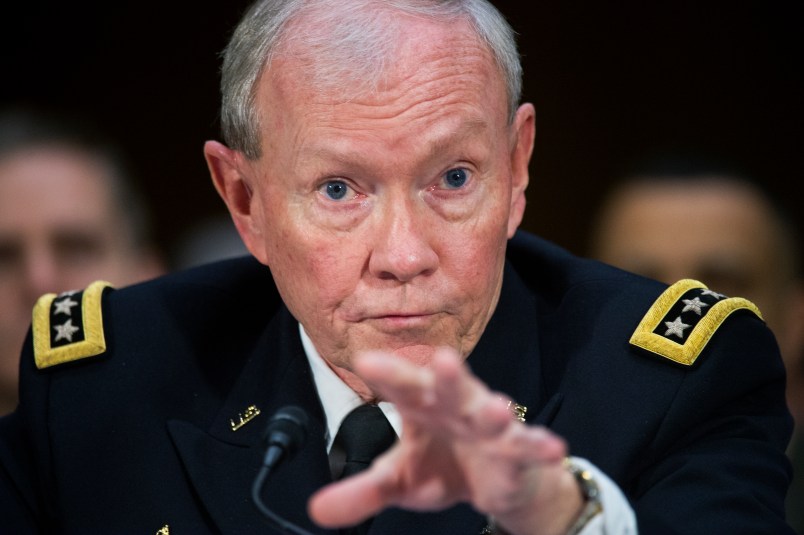JERUSALEM (AP) — An expected White House decision to send several hundred more troops to Iraq to expand training of Iraqi forces in Anbar province is not a shift in U.S. strategy but is aimed at helping Iraq retake the provincial capital, Ramadi, and eventually blunt the Islamic State’s battlefield momentum.
The decision, which could be announced as soon as Wednesday, would increase the number of U.S. training sites in Iraq from four to five and enable a larger number of Iraqis — mostly Sunni tribal volunteers, in this case — to join the fight against the Islamic militant group. It is consistent with the overall U.S. approach of building up Iraqi forces while simultaneously conducting aerial bombing of Islamic State targets.
U.S. officials have said repeatedly that getting the Sunnis more deeply involved in the war is critical to ousting IS from Anbar.
It leaves open, however, the larger question of whether the Shiite-led Iraqi government will make the troop commitments necessary to oust the Islamic State from Ramadi, which the militants captured last month, and Fallujah, which they have held for more than a year. Up to now, Iraqi officials have chosen to deploy most U.S.-trained Iraqi troops in defensive formations around Baghdad, the capital.
President Barack Obama has ruled out sending U.S. ground combat forces to Iraq. There now are slightly fewer than 3,100 U.S. troops there in training, advising, security and other support roles. The U.S. also is flying bombing missions as well as aerial reconnaissance and intelligence-gathering missions to degrade the Islamic State’s forces, while counting on Iraqi ground troops to retake lost territory.
A U.S. official said Wednesday that the extra U.S. training site will be at al-Taqqadum, a desert air base that was a U.S. military hub during the 2003-2011 war. Establishing the training camp will require between 400 and 500 U.S. troops, including trainers, logisticians and security personnel, the official said, speaking on condition of anonymity because a final administration decision had not been announced.
The U.S. already is training Iraqi troops at four sites — two in the vicinity of Baghdad, one at al-Asad air base in Anbar province and one near Irbil in northern Iraq.
The addition of one training site is a modest tweak to the existing U.S. approach in Iraq. It was unclear Wednesday how many more Iraqi troops could be added to the fight against IS in coming months by opening one new training base. One official said the training at al-Taqqadum is likely to being this summer.
Over the past year the U.S. has trained approximately 9,000 Iraqi troops.
The new plan is not likely to include the deployment of U.S. forces closer to the front lines to either call in airstrikes or advise smaller Iraqi units in battle, officials said. One official, however, said the adjustment may include a plan for expediting the delivery of arms and military equipment to some elements of the Iraqi military.
On Tuesday, Gen. Martin Dempsey, chairman of the Joint Chiefs of Staff, said in Jerusalem that he has recommended changes to President Barack Obama but he offered no assessment of when decisions would be made and announced. He suggested the president was considering a number of questions, including what adjustments to U.S. military activities in Afghanistan and elsewhere in the world might be needed if the U.S. does more in Iraq.
Dempsey said the Pentagon also is reviewing ways to improve the effectiveness of its air campaign, which is a central pillar of Obama’s strategy for enabling Iraqi ground forces to recapture territory held by the Islamic State.
Obama said Monday that the United States still lacks a “complete strategy” for training Iraqi forces. He also urged Iraq’s Shiite-dominated government to allow more of the nation’s Sunnis to join the campaign against the violent militant group.
Dempsey said Obama recently asked his national security team to examine the train-and-equip program and determine ways to make it more effective. Critics have questioned the U.S. approach, and even Defense Secretary Ash Carter has raised doubts by saying the collapse of Iraqi forces in Ramadi last month suggested the Iraqis lack a “will to fight.”
The viability of the U.S. strategy is hotly debated in Washington, with some calling for U.S. ground combat troops or at least the embedding of U.S. air controllers with Iraqi ground forces to improve the accuracy and effectiveness of U.S. and coalition airstrikes. Dempsey was not specifically asked about that but gave no indication that Obama has dropped his resistance to putting U.S. troops into combat in Iraq.
“What he’s asked us to do is to take a look back at what we’ve learned over the last eight months of the train-and-equip program, and make recommendations to him on whether there are capabilities that we may want to provide to the Iraqis to actually make them more capable … whether there are other locations where we might establish training sites,” and look for ways to develop Iraqi military leaders, he said.
Dempsey said there will be no radical change to the U.S. approach in Iraq. Rather, it is a recognition that the effort has either been too slow or has allowed setbacks where “certain units have not stood and fought.” He did not mention the Ramadi rout specifically, but Dempsey previously has said the Iraqis drove out of the city on their own.
“Are there ways to give them more confidence?” This, he said, is among the questions Obama wanted Dempsey and others to answer.
Copyright 2015 The Associated Press. All rights reserved. This material may not be published, broadcast, rewritten or redistributed.






